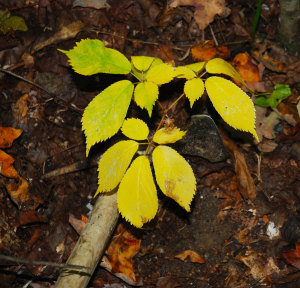By Chris Erwin
Before we get into harvesting ginseng in Kentucky, I think it’s worth going over what ginseng is and what it is used for.
Ginseng is an herb. The root is used to make medicine. American wild ginseng should not to be confused with Siberian ginseng or Asian ginseng; both have different properties. It is the American wild ginseng that is becoming rare because it is so popular and has so many uses. Some states have declared American ginseng a threatened or endangered species because so many people try to harvest it.
It used to treat stress, to boost the immune system, and as a general tonic and stimulant. It’s also used to fight infections such as colds and flu. There is some evidence that it might help prevent colds and flu and make symptoms milder when infections do occur. It is also used to treat infections, including HIV/AIDS, infections of the intestine (dysentery), and Pseudomonas infections, which are common in people with cystic fibrosis.
Some people use American ginseng to improve digestion or for loss of appetite, as well as for vomiting, inflammation of the colon (colitis), and inflammation of the lining of the stomach (gastritis).
American ginseng is also used for low iron in the blood (anemia), diabetes, trouble sleeping (insomnia), nerve pain, erectile dysfunction (ED), fever, hangover symptoms, attention deficit-hyperactivity disorder (ADHD), blood and bleeding disorders, cancer, painful joints, dizziness, headaches, convulsions, fibromyalgia, “hardening of the arteries” (atherosclerosis), memory loss, and as an anti-aging aid.

Wild American Ginseng sells for up to $300 an ounce dried, so it is easy to see why it must be managed. Kentucky is no exception when it comes to managing the harvest and selling of the herb.
Many hunters in Kentucky will hunt ginseng at the same time they are scouting for deer, and that is why I felt it was a good time to cover this subject.
You can legally harvest ginseng in Kentucky from Sept.1 through Dec. 1 and a permit it not required on private land. However, it is illegal to harvest ginseng on public land except for inside the Daniel Boone National Forest, but you do need a permit to harvest it there. It is also illegal to harvest ginseng in the DBNF for commercial sale. In other words, it can only be for personal use if it is harvested in DBNF.
In Kentucky ginseng must be sold to a licensed dealer and dealers must obtain a license from the Kentucky Department of Agriculture, which serves as the state’s ginseng coordinator. Annual dealer license fees are $75 for Kentucky residents and $150 for nonresidents.
Harvested ginseng must be at least 5-years-old or a three-prong plant. If berries are present, you must plant them within 50 feet from the plant being harvested. They must be planted using only your finger to plant. If you plant seeds too deep they will not grow.
Uncertified dry ginseng may only be sold in-state from September 15 to March 31 of the next year. Uncertified green (non-dry) ginseng may be sold starting on September 1 through March 31.
Ginseng may be certified via a $2 per pound fee, and certified ginseng may be sold year-round and/or sold in interstate commerce.
To obtain a permit to harvest ginseng in the DBNF for personal use only, contact the Forest Supervisor’s Office in Winchester at (859) 745-3100.


is illegal to sell just the ginseng seeds off ebay without a permit , off your ginseng on your on property